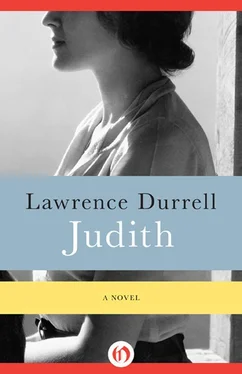She wondered how the infernal racket of rifles was not audible outside and, as if he had read her thoughts, David said: “Partly because we’re deep in the ground, and partly because of the thick walls. During the last arms search we carried on throughout down here and if they heard anything they might have thought it was a couple of typewriters.” He seemed to say more, but at that moment a burst of gunfire broke out at the end, and the cloth and cardboard dummies wavered and danced grotesquely under the hail of shot, like wet shirts hanging on the line in a high wind. David motioned her forward and Grete obediently took her place in a line of girls. He brought her a Sten gun and said: “Before I break it down, I’d like you to try it for weight and for kick. Take a shot at those targets.”
“I started trembling violently. The targets had turned into the frightened and bewildered faces of Jewish families standing in the snowlit square of a German town, hands above their heads, waiting to receive the sweep of steel bullets across their chests. I threw down the weapon with a cry and, putting my hands over my ears, I ran in a blundering attempt to find the way out. David watched me for a moment in surprise, and then in apparent pity. I suppose I was rather like a wild animal in a trap, yelling ‘Let me out! let me out! I want to go !’ ”
Judith remembered her own first experience of arms drill at the kibbutz, and mentally compared her own irritation and frustration to the other girl’s terror. Neurotic, she thought, but thought it kindly. She nodded as Grete continued her story. David had come towards her with outstretched arms, saying, “Calm yourself, please… but she had run round the walls, from point to point, bay to bay, as he followed her, speaking in a cajoling voice. When she could go no further, and he had her cornered in an archway, he put his hand on her arm. “Listen, Grete,” he said, “if we are attacked here, there is nowhere to go except into the sea. There is no choice. We must learn to defend ourselves.”
But with quivering lips and pale face she repeated, almost beseechingly:
“I can’t do it! Don’t you see, I can’t do it! I have seen so much of it. Don’t make me!”
Then he made the mistake of saying:
“Lives were risked to bring you here. Doesn’t the existence of Israel matter to you?”
“Nothing matters to me!” she screamed. “Please let me go.”
“Very well,” he said coldly. “Anna, bring the bandage.” He motioned Grete gently forward and tied the bandage round her eyes. “I’ll send you back to your room,” he said softly, but there was a deep note of disdain and chagrin in his voice.
She turned her pale face to him and said:
“Listen, I’m sorry if I… but he cut her sentence short abruptly, saying:
“There is no need to be sorry. You’re clearly a very egotistical person, and we don’t want people like you. Ours is a voluntary organization, so please don’t imagine that I’m going to press-gang you. Anna, take her.”
And as he turned away, she heard him call:
“Cross Grete Schiller’s name off the roster.”
It seemed like a black mark against her, and she bit her lip furiously and said nothing.
A few minutes later, she found herself standing on the river bank by herself. The figure of Anna, foreshortened by distance, stumped off into the surrounding field. Grete made a half-gesture, as if to restrain her or to call her back. Then, a sudden impulse overtook her. She turned and ran towards the administrative building where Peterson sat doing accounts. Grete burst in on her breathlessly.
“Pete,” she cried, “I’m no good, I’m no use to you at all. You must send me away somewhere. I shall only disgrace myself and prove my uselessness if I stay. Already they are beginning to hate me.”
“Pull up that chair,” said Peterson sternly, after a pause. She pushed a box of cigarettes across the table. Grete refused. She burst out vehemently:
“Oh, I wish it was different! Perhaps I am an egotist, perhaps that’s what it is! David is probably right.”
“Of course he’s right! You couldn’t be a woman without being an egotist, any more than you could be a man and not be an opinionated ass. David’s a fool. What’s he been saying to you?”
Grete shook her head. “No, he’s right,” she said. “I care nothing for Palestine. It means nothing to me. All I care about is to see my child again.”
A girl came in and brought cups of tea. “Drink this,” said Peterson and, taking a little tube of pills from an attaché case beside the desk, she dropped a couple into Grete’s cup.
Peterson stared at her for a long time without saying anything. Then she said:
“Of course I can send you away, and perhaps I shall have to. We can’t carry too many pairs of idle hands and large appetites around here. We already have a share of old people whom we look after and who contribute nothing to the work.”
“I’m ashamed of myself,” murmured Grete.
“ That ,” said Peterson, “is the final egotism. I’m going to give you one more chance before sending you away. If you can’t get on with the grown-ups, we’ll see if you can help with the children. How do you feel about that?”
Grete stood up and said: “Thank you, I will try again.”
“Good. Then you can take night duty, tonight,” Peterson said. “I’ll have you called.”
As Grete turned to the door, Peterson added:
“Grete, the worst of all our weaknesses is self-pity.”
Grete turned to her and replied:
“I see, you are beginning to hate me too.”
“On the contrary,” said Peterson. “You can count on me.”
But Grete shook her head sadly, and went down the staircase in a deep despondency, head bowed. Halfway down, she met David coming up. He hesitated and opened his mouth as if he were about to say something, then changed his mind. He looked away, and passed her without a word.
He found Peterson standing at the window and smoking. She did not turn round when he came in.
“Pete,” he said, “we’ve done our shoot, but I’ve had to cross that wretched Schiller girl off the roster. She’s an uncooperative prig and a true-blue hysteric. It is infuriating that she is as attractive as she is.”
“She also happens to have spent her last eighteen months in a German officers’ brothel.” She turned and faced him, and they stood staring at each other for a long time without saying any more.
Peterson was as good as her word, and that evening Rose Fox came over to Grete’s table at dinner.
“I hear they’ve posted you to night work with the children. I’m glad and I hope you are too. There is a lot to observe and a lot of them who are sympathy-starved.” Her own two boys were among the inhabitants of the children’s camp. Grete liked her immediately, and together the two young women finished their dinner, gossiping lightly before traversing the gardens which the children themselves had planted and were working, as part of their education.
“Here,” said Rose, “the future farmers of the settlement are making their first experiments with flowers and vegetables. As you see, some are lazier than others. But no one could accuse David’s son of laziness.”
“David’s?” asked Grete with surprise.
“You know David,” said the girl Rose. “David Eveh…
“I had no id… idea… stammered Grete, “that he had a… child.”
“Well, all these trees are his work,” said Rose, pointing to a clump of eight young peach trees.
Rose whispered about the sleeping children; they came to a cubicle with four beds in it. The psychologist pointed a finger and whispered to Grete:
“That’s David’s son.” An exceptionally handsome boy about eleven or twelve years old, bearing a marked resemblance to David, lay asleep. One hand protruded slightly from under the pillow. It held an imitation pistol of wood. The doctor quietly removed it and put it on the shelf.
Читать дальше












